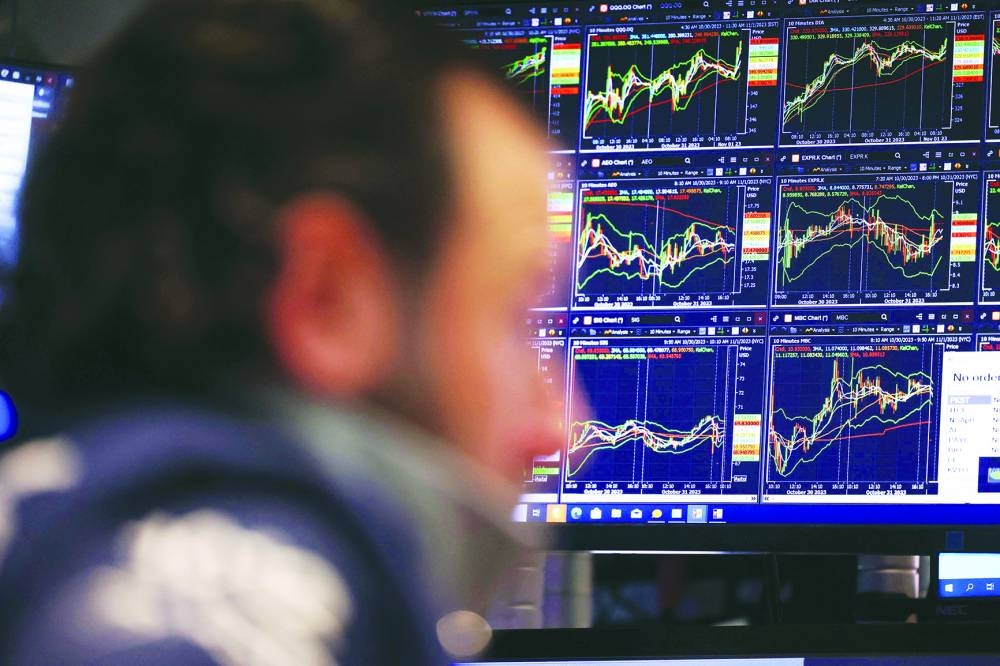The stock market has recovered most of the losses suffered in its summer selloff. While the S&P 500 Index has bounced back before, this time is unique because it isn’t being led by Big Tech — instead it’s everyone else’s turn.
Technology giants like Nvidia Corp and Microsoft Corp have led gains in the equities benchmark for much of the last two years, with investors attracted to their booming profits and exposure to artificial intelligence. But now traders are rotating into sectors like real estate, utilities and consumer staples amid fears of sputtering economic growth and with the Federal Reserve preparing to start cutting interest rates as soon Wednesday.
Since the S&P 500 peaked on July 16, the so-called Magnificent Seven tech stocks — Nvidia, Microsoft, Apple Inc, Alphabet Inc, Amazon.com Inc, Meta Platforms Inc and Tesla Inc — have mostly slumped, with the Bloomberg Magnificent 7 Index falling 5.3%. And while the broader equities benchmark is down less than 1% over that time, largely due to the S&P’s outsized weightings of those fast growing tech giants, usually sleepy sectors have led the index by a wide mark, with both real estate and utilities gaining 11%.
Those figures include last week’s rally in the S&P 500, which was led by the tech
sector.
“Investors love to look at companies that are going from earnings declines to earnings gains,” Michael Casper, an equity strategist at Bloomberg Intelligence, said in an interview. “That’s kind of leading them away from tech and to the other 493 stocks that were cast aside.”
The rotation has been aided by expectations for monetary policy easing. But it’s also a testament to the improving outlook for profits in the rest of the market at a time when big spending by tech giants is raising concerns about their margins. Whether it’s a blip or a longer-term trend, however, will likely rest on the path of the economy. Markets will get a big clue on that from the Fed this week, with traders roughly split on the central bank delivering a quarter- or half-point reduction.
“We don’t believe we’re going into a recession, and the stocks that will begin to show leadership are the cyclicals that will benefit from higher economic growth and lower interest rates,” said Adam Grossman, chief investment officer for global equities at Riverfront Investment Group, who added that large cap tech stocks remain his firm’s biggest overweight position.
Deterioration in the economy would likely benefit defensive sectors, but that also tends to be a good environment for tech stocks, according to Keith Lerner, co-chief investment officer at Truist Advisory Services.
“If there’s some uncertainty, our view is investors will continue to pay a premium for growth prospects,” Lerner said in an interview. “If things continue to slow down, defensive would continue to do well. In either environment, slowdown or still some stability, I think tech does well.”
Another factor helping sectors outside of tech is improving earnings outlooks. Take health care as an example: After seven consecutive quarters of shrinking profits, earnings from healthcare companies rose 16% in the second quarter, according to data compiled by Bloomberg Intelligence. That expansion is expected to continue through the remainder of the year, with profit growth projected to hit 45% in the first quarter of 2025.
Of course, earnings from tech behemoths remain strong. They just aren’t climbing at the rapid clip they were in the past couple of years, which was driven by steady sales growth and a focus on efficiency that resulted in hundreds of thousands of job cuts across the industry.

A trader works on the floor of the New York Stock Exchange. While the S&P 500 Index has bounced back before, this time is unique because it isn’t being led by Big Tech — instead it’s everyone else’s turn.
